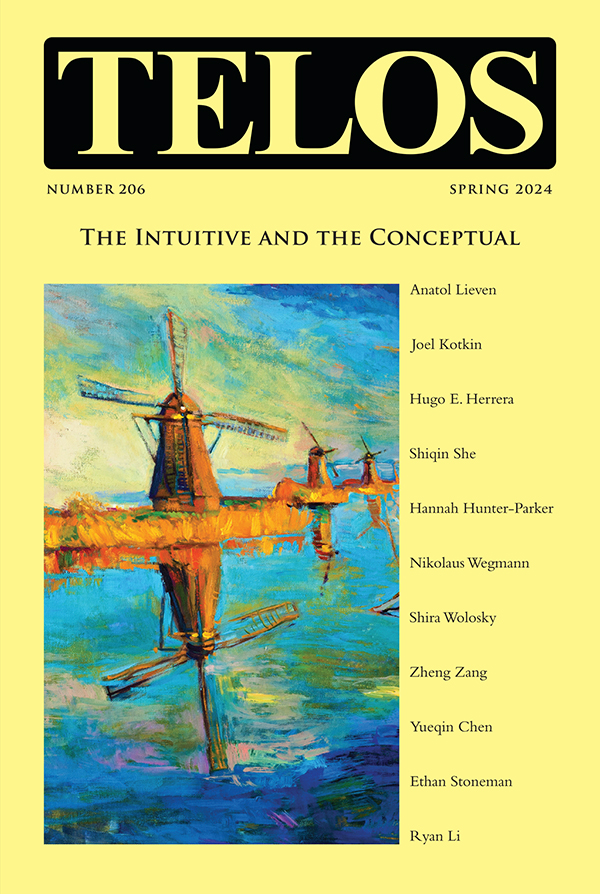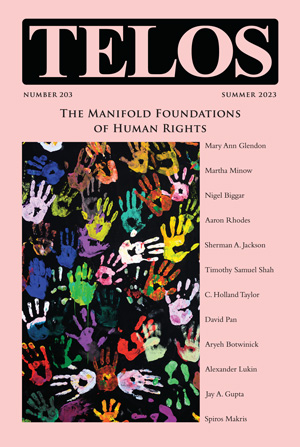By David Pan · Friday, April 5, 2024 Telos 206 (Spring 2024): The Intuitive and the Conceptual is now available for purchase in our store. Individual subscriptions to Telos are also available in both print and online formats.
 We often have the experience of intuiting something without being able to precisely define what that intuition is. Sometimes this intuition leads to a more well-defined insight, and sometimes it might lead to some kind of action, even in the absence of clear conceptual definitions. Yet it is difficult to ascertain what kind of knowledge or awareness such intuitions consist of. What is an intuition as opposed to a defined concept of something? How seriously should we take such intuitions? Are they something separate and qualitatively different than concepts? Are they just fuzzy concepts? Do they really exist at all? These are crucial questions because they lead to conclusions about the status of concepts themselves. If the alternative to clear concepts is nothing at all, then the sociopolitical corollary would be that the alternative to conceptual knowledge and the holders of such knowledge would also be nothing at all. By contrast, if intuitions are separate from concepts and real, then expert knowledge might possibly have some deficiencies in comparison with intuitions. The essays in this issue of Telos explore in one way or another this question of the status of conceptual knowledge as opposed to intuitive awareness. We often have the experience of intuiting something without being able to precisely define what that intuition is. Sometimes this intuition leads to a more well-defined insight, and sometimes it might lead to some kind of action, even in the absence of clear conceptual definitions. Yet it is difficult to ascertain what kind of knowledge or awareness such intuitions consist of. What is an intuition as opposed to a defined concept of something? How seriously should we take such intuitions? Are they something separate and qualitatively different than concepts? Are they just fuzzy concepts? Do they really exist at all? These are crucial questions because they lead to conclusions about the status of concepts themselves. If the alternative to clear concepts is nothing at all, then the sociopolitical corollary would be that the alternative to conceptual knowledge and the holders of such knowledge would also be nothing at all. By contrast, if intuitions are separate from concepts and real, then expert knowledge might possibly have some deficiencies in comparison with intuitions. The essays in this issue of Telos explore in one way or another this question of the status of conceptual knowledge as opposed to intuitive awareness.
Continue reading →
By David Pan · Wednesday, July 26, 2023 Telos 203 (Summer 2023): The Manifold Foundations of Human Rights is now available for purchase in our store. Individual subscriptions to Telos are also available in both print and online formats.
 One of the most disappointing human rights debacles in the last few years was the withdrawal of U.S. forces from Afghanistan. For those who still take an interest, the human rights situation there has become horrendous, with Human Rights Watch documenting the denial of schooling and employment to women, extrajudicial killings, and torture. Moreover, in a severe rebuttal to those who supported the withdrawal, Taliban rule has created the conditions for a renewal of terrorist groups that can now develop and train in Afghanistan with impunity. There is also a good case to be made that the U.S. withdrawal there emboldened Putin to invade Ukraine, calculating that the United States and its allies no longer have the stomach for protracted conflicts in order to prevent human rights abuses. It may be that we have traded a low-grade conflict in Afghanistan for a high-intensity one in Ukraine. The lesson here is that the struggle for human rights, while beginning as a moral problem about our common responsibilities, can only be taken seriously when we consider its political ramifications. What do we owe to our fellow humans, and what sacrifices should we make in order to fulfill those responsibilities? One of the most disappointing human rights debacles in the last few years was the withdrawal of U.S. forces from Afghanistan. For those who still take an interest, the human rights situation there has become horrendous, with Human Rights Watch documenting the denial of schooling and employment to women, extrajudicial killings, and torture. Moreover, in a severe rebuttal to those who supported the withdrawal, Taliban rule has created the conditions for a renewal of terrorist groups that can now develop and train in Afghanistan with impunity. There is also a good case to be made that the U.S. withdrawal there emboldened Putin to invade Ukraine, calculating that the United States and its allies no longer have the stomach for protracted conflicts in order to prevent human rights abuses. It may be that we have traded a low-grade conflict in Afghanistan for a high-intensity one in Ukraine. The lesson here is that the struggle for human rights, while beginning as a moral problem about our common responsibilities, can only be taken seriously when we consider its political ramifications. What do we owe to our fellow humans, and what sacrifices should we make in order to fulfill those responsibilities?
Continue reading →
|
|
 We often have the experience of intuiting something without being able to precisely define what that intuition is. Sometimes this intuition leads to a more well-defined insight, and sometimes it might lead to some kind of action, even in the absence of clear conceptual definitions. Yet it is difficult to ascertain what kind of knowledge or awareness such intuitions consist of. What is an intuition as opposed to a defined concept of something? How seriously should we take such intuitions? Are they something separate and qualitatively different than concepts? Are they just fuzzy concepts? Do they really exist at all? These are crucial questions because they lead to conclusions about the status of concepts themselves. If the alternative to clear concepts is nothing at all, then the sociopolitical corollary would be that the alternative to conceptual knowledge and the holders of such knowledge would also be nothing at all. By contrast, if intuitions are separate from concepts and real, then expert knowledge might possibly have some deficiencies in comparison with intuitions. The essays in this issue of Telos explore in one way or another this question of the status of conceptual knowledge as opposed to intuitive awareness.
We often have the experience of intuiting something without being able to precisely define what that intuition is. Sometimes this intuition leads to a more well-defined insight, and sometimes it might lead to some kind of action, even in the absence of clear conceptual definitions. Yet it is difficult to ascertain what kind of knowledge or awareness such intuitions consist of. What is an intuition as opposed to a defined concept of something? How seriously should we take such intuitions? Are they something separate and qualitatively different than concepts? Are they just fuzzy concepts? Do they really exist at all? These are crucial questions because they lead to conclusions about the status of concepts themselves. If the alternative to clear concepts is nothing at all, then the sociopolitical corollary would be that the alternative to conceptual knowledge and the holders of such knowledge would also be nothing at all. By contrast, if intuitions are separate from concepts and real, then expert knowledge might possibly have some deficiencies in comparison with intuitions. The essays in this issue of Telos explore in one way or another this question of the status of conceptual knowledge as opposed to intuitive awareness. 


